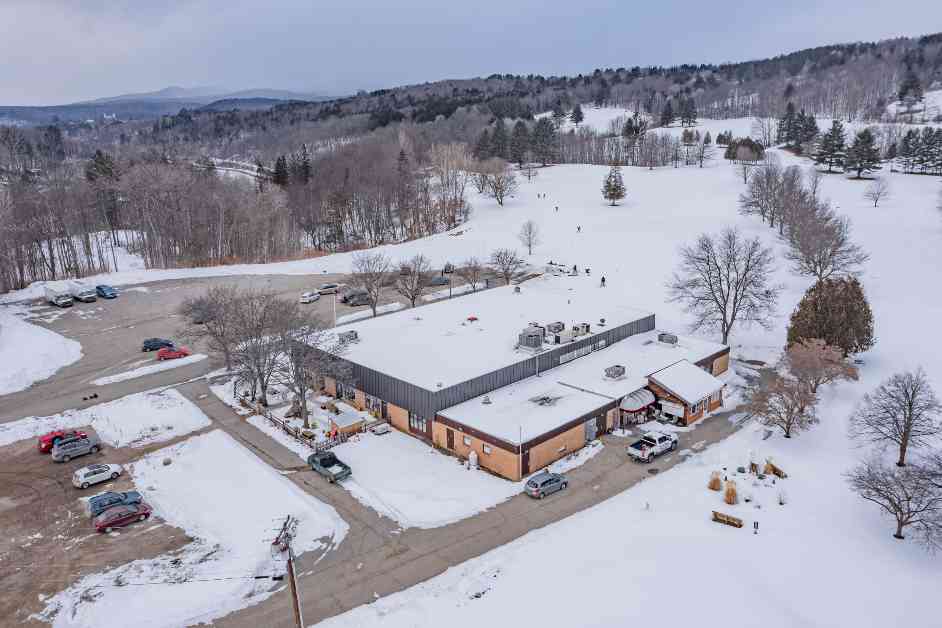In May 2018, a limited liability company called Citi Properties, with Steve Ribolini as its registered agent, acquired a 138-acre golf course property from the Elks Club for $1.2 million. The following August, The HUB, a nonprofit organization, initiated discussions with Ribolini to potentially purchase or lease land at the former golf course for various recreational facilities. These included plans for an indoor tennis and pickleball facility, outdoor courts, virtual golf, a restaurant, and more.
Moving into September 2021, representatives from The HUB met with city officials to present their proposed plans. Simultaneously, the city had been contemplating the construction of a new recreation facility at the Elm Street recreation fields. However, after deliberation, the city decided to pursue the purchase of the golf course property and construct a new recreation building there instead.
Come January 2022, the city council voted to increase the bond for the Town Meeting Day ballot to $2 million for acquiring the former Elks Club, now known as the Country Club Road (CCR) property. This amount, combined with $1 million from the recreation fund, would cover the $3 million purchase price determined by an appraisal. City Manager Bill Fraser hinted at potential public/private partnerships with The HUB for the development of recreational facilities on the property.
By March 2022, the city voted in favor of authorizing a $2 million bond for the purchase of the CCR property from Citi Properties, LLC. As the city encouraged ideas for new housing on the site leading up to the vote, the community showed strong support for the project. Subsequently, in June 2022, the city successfully closed on the $3 million purchase of the CCR property.
Public Engagement and Development Plans
In the period between October 2022 and May 2023, a series of nine public hearings, both on-site and online, were conducted to gather input on the potential use of the property. White + Burke Real Estate Advisors, a firm hired by the city through a competitive process, spearheaded these efforts. Surveys were also distributed to solicit feedback from the public, ensuring a comprehensive understanding of community needs and preferences.
Come June 2023, White + Burke presented the city council with an “Actionable Plan” derived from the extensive community engagement initiatives. Although the council accepted the plan, they did not officially endorse any specific concepts. The city allocated approximately $500,000 to White + Burke for the development of detailed proposals for the property, setting the stage for further progress and collaboration.
Challenges and Adaptive Reuse
The city faced a significant setback in July 2023 when a major flood struck Montpelier, prompting emergency responses and adaptive reuse of the CCR property. In September of the same year, an agreement was reached to lease the former Elks Building to Good Samaritan Haven for use as a winter homeless shelter. This adaptive measure aimed to address immediate community needs and provide essential support to vulnerable populations.
Subsequent to the flood, FEMA approached the city in September 2023 to negotiate the placement of 36 trailers on the CCR property to accommodate flood victims. Despite initial agreements, FEMA later decided against developing a temporary housing site for flood victims at the property. As a result, the city received a financial compensation of $513,216 from FEMA, highlighting the complex dynamics of disaster response and recovery efforts.
As the city navigated evolving circumstances and community demands, December 2023 brought a lukewarm response from the city council to a consultant’s report on the operating costs associated with building a new recreation center. Councilors expressed concerns over potential expenses, estimating a broad range of $44 to $50 million for the project, contingent on factors like the inclusion of a pool. This financial ambiguity underscored the need for prudent planning and strategic decision-making in future endeavors.
Throughout the course of development, the city encountered zoning challenges in February 2024, prompting amendments to the zoning code to facilitate the transformation of the CCR property. Notably, the rezoning efforts aimed to position the property for mixed-use developments, allowing for the construction of five-story buildings in designated areas while preserving the natural landscape in others.
As the city grappled with zoning complexities, April 2024 witnessed the approval of a new zoning designation for the lower open area of the CCR property, transitioning it to an Urban Residential zone. This zoning adjustment reflected the city’s commitment to sustainable and inclusive urban planning practices, fostering a vibrant and diverse community landscape.
With an eye towards enhancing public safety and property management, the city took proactive steps in August 2024 to ban encampments at the CCR property, ensuring orderly and secure utilization of the land. Subsequently, in September 2024, the city pursued Growth Center approval to streamline development processes and regulatory requirements for the CCR property. This strategic initiative aimed to facilitate efficient and responsive growth within the community, promoting economic vitality and environmental sustainability.
Despite initial progress, the city encountered regulatory hurdles in October 2024 when the state Community Investment Board revoked conditional approval previously granted for the Growth Center application. This setback underscored the intricate interplay between local aspirations and state regulations, necessitating a collaborative and adaptive approach to urban planning and development.
As the city navigated regulatory challenges, another consultant concluded a report on recreation options for the community in October 2024. The report highlighted divergent citizen perspectives on the location of a new recreation center, emphasizing the need for inclusive and transparent decision-making processes. Moreover, the report underscored the untapped potential of the Elks Building at the CCR property, signaling opportunities for adaptive reuse and revitalization within the community.
To address critical infrastructure needs, December 2024 saw the city engage an engineering firm to design and estimate costs for water and sewer infrastructure improvements at the CCR property. This proactive investment aimed to enhance the property’s utility services and support future development initiatives, laying a foundation for sustainable growth and resilience within the community.
In a bid to promote strategic partnerships and innovative solutions, the city council deliberated on proposals for the private or nonprofit recreational utilization of portions of the existing building and grounds at the Country Club Road. This collaborative approach sought to leverage community expertise and resources, fostering a culture of shared responsibility and collective stewardship for public amenities and recreational spaces.
By weaving together community engagement, adaptive reuse strategies, and sustainable development practices, the city of Montpelier embarked on a transformative journey to revitalize the Country Club Road property. As the city continued to navigate evolving challenges and opportunities, the collective efforts of residents, policymakers, and stakeholders laid the groundwork for a resilient, inclusive, and vibrant community landscape, poised for sustainable growth and prosperity in the years to come.



















